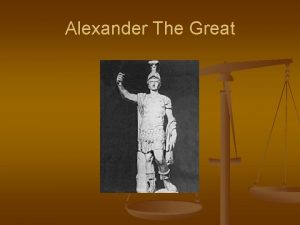Alexander the great His relion Alexander III of








- Slides: 8

Alexander the great

His relion • Alexander III of Macedon, also popularly known as Alexander the Great, was a follower of the Greek polytheistic religion, also called, Hellenism. They worshipped a hierarchy of deities, with Zeus being the king of the gods.

Where he was born • • He was born in Pela, Greece in 306 B. C He died in Babylon in 323 B. C Philip II of Macedon (Father) · Olympias (Mother)

Who where his brothers and sisters • • • Philip III of Macedon (Brother) Cleopatra of Macedon (Sister) Cynane (Sister) Thessalonike of Macedon (Sister) Caranus (Brother) Europa of Macedon (Sister)

Alexander the Great: info • Alexander III of Macedon, commonly known as Alexander the Great, was a king of the ancient Greek kingdom of Macedon and a member of the Argead dynasty. He was born in Pella in 356 BC and succeeded his father Philip II to the throne at the age of 20. He spent most of his ruling years on an unprecedented military campaign through western Asia and northeast Africa, and by the age of thirty, he had created one of the largest empires of the ancient world, stretching from Greece to northwestern India. He was undefeated in battle and is widely considered one of history's most successful military commanders

How he died • In February 323 BC, Alexander ordered his armies to prepare for the march to Babylon. According to Arrian, after crossing the Tigris Alexander was met by Chaldeans, who advised him not to enter the city because their deity Bel had warned them that to do so at that time would be fatal for Alexander. The Chaldeans also warned Alexander against marching westwards as he would then look to the setting sun, a symbol of decline. It was suggested that he entered Babylon via the Royal Gate, in the western wall, where he would face to the east. Alexander followed this advice, but the route turned to be unfavorable because of swampy terrain. According to Jona Lendering, "it seems that in May 323" the Babylonian astrologers tried to avert the misfortune by substituting Alexander with an ordinary person on the Babylonian throne, who would take the brunt of the omen. The Greeks, however, did not understand that ritual

Causes • Proposed causes of Alexander's death included alcoholic liver disease, fever, and strychnine poisoning, but little data support those versions. According to the University of Maryland School of Medicine report of 1998, Alexander probably died of typhoid fever (which, along with malaria, was common in ancient Babylon).

Please watch this video https: //www. bbc. co. uk/teach/class-clipsvideo/history-ks 3 --gcse-the-legacy-of-alexanderthe-great/zf 3 r 8 xs















